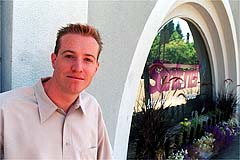In Praise of the Mom-and-Pop I.S.P.
Homespun Touches Help
Some Small Providers
Hold On to Customers
By KATIE HAFNER
|

Marc Geller for The New York Times
|
Dane Jasper, who founded Sonic.net six years ago, said many other independent I.S.P.'s in California had been acquired by bigger companies.
|
 OR the past four years, I have remained loyal to my
Internet service provider. It is not EarthLink, nor is
it MindSpring. And it is definitely not America
Online.
OR the past four years, I have remained loyal to my
Internet service provider. It is not EarthLink, nor is
it MindSpring. And it is definitely not America
Online.
When possible, I support cottage industries. My milk
comes from a local dairy, and my Internet connection
comes from a small company in Santa Rosa, Calif., called
Sonic.net. Few people outside Sonoma County have heard of it.
Sonic.net's 30 or so employees work in a small office
building in downtown Santa Rosa, two doors from a
pawnshop and across from the town square.
I could pay my $20 each month to any I.S.P. and get
about the same thing, of course, but subscribing to Sonic.net
makes me feel virtuous and civic-minded.
Being a Sonic.net customer today must be a lot like
being a customer of Woodbury Telephone Company in
Connecticut 50 years ago, or any of the thousands of
small telephone companies before they were swallowed
by the Bell System.
Or maybe it's like living in a town
that still has a thriving independent bookstore, whose
owners have a stake in the local community that is more
than merely financial.
Web service providers like Sonic.net were common in
the early 1990's. But in the past five years or so, many of
the smallest ones have disappeared while AOL and a
handful of others have undergone explosive growth.
By numbers alone, the Web service business doesn't
look so dire. Boardwatch magazine, which tracks I.S.P.'s,
recently reported more than 7,400 providers in North
America, an increase of roughly 2,000 over last year. But
those numbers reflect the changing nature of the business itself.
"A lot of I.S.P.'s are part of another business," said
Todd Judd Erickson, managing editor of Boardwatch.
Mr. Erickson pointed out that Denver's two main newspapers used the servers, routers, modems and phone
lines they already had on hand to offer Internet service,
as do several of the nation's banks. "If they have to have
the equipment in their office anyway, they might as well
offer Internet service," Mr. Erickson said.
It is the typical homespun Internet service provider,
serving a thousand or so local customers from a small
office filled with modems, that has it rough these days.
"The pure dial-up I.S.P. play is tough to make money on
because it's becoming such a commodity," Mr. Erickson
said. "If you don't like your I.S.P., just go with another
one."
Dane Jasper, a freckle-faced 27-year-old, his hair
peppered with subtle highlights of pink and green,
dropped out of the local junior college six years ago to
start Sonic.net. Two years ago, Mr. Jasper said, Sonic.net
belonged to a group of seven independent companies that
called themselves the California Independently Owned
I.S.P. Association. But one by one, those small companies
have been acquired by larger providers, making Sonic.net
the sole survivor, Mr. Jasper said.
"It's a minefield that we walk through," he added.
With 15,000 customers, Sonic.net is one of the
bigger independent Web service providers.
FIX Net, a seven-year-old provider in San
Luis Obispo, Calif., has just 5,000 customers.
And Downeast.net, a company in Ellsworth,
Maine, is even smaller, with 1,000 customers. The companies have bolstered their
businesses with commercial customers.
To compete effectively against the behemoths, small companies need to offer personalized customer service, said Cheryl
Woodard, 28, the president, chief executive
and chief financial officer at FIX Net. ("I
sell popcorn at halftime, too," she said.)
Calls to FIX Net for technical support are
not farmed out to a call center in Utah,
Ireland or points beyond. Ms. Woodard said,
"People can walk in the door and meet the
technician who's been helping them."
Sonic.net is similar. Call tech support, and
you are treated like royalty. Any of the 15
technicians, several of them still teenagers,
focus on your problem with the single-mindedness of emergency room doctors rallying
to someone who has been transported to the
hospital by helicopter.
At FIX Net, Ms. Woodard offers free
classes. Both FIX Net and Downeast.net
invite customers to haul in their computers
to have software installed at no charge. "We
do an awful lot of hand-holding," said Don
McKillop, who owns Downeast.net with his
wife, Jean, and Noel Paul Stookey, of Peter,
Paul and Mary.
At Sonic.net, Mr. Jasper makes the occasional house call. Still, Mr. Jasper said, it is hard
to compete with the flood of advertising and
sign-up rewards from the likes of AOL and
Microsoft's MSN. "All the big players are
spending hundreds of dollars to acquire new
customers," he said. "So we just took a huge
chunk of our advertising budget and started
paying it to customers for referrals. Everyone who refers someone to us gets a $20
check in the mail."
Then there is the community aspect of a
local service provider.
Go to FIX Net's
home page, and you will see a grid of images
depicting local scenes: the bell from the San
Luis Obispo mission, the nearby coastline.
The company's official slogan is "Worldwide Technology -- Hometown Service and
Support."
Local ties are also important for Sopris
Surfers, a Web service provider in Carbondale, Colo., 30 miles north of Aspen, with
5,000 customers. "People in our valley want
to keep their money local," said Paul Huttenhower, chief executive of Sopris Surfers.
My favorite thing about Sonic.net is the sense
I have that Mr. Jasper and his employees
want to keep me informed about the technical goings-on behind the curtain.
I once used Sonic.net for full Web access, but
now that I have that access through my job,
I use Sonic.net mainly for personal e-mail.
While Sonic.net offers regular e-mail service, I
go online through my company's system
and retrieve my Sonic.net e-mail via Telnet, a
command-based method for logging into a
computer remotely.
| |
|
Local Internet providers
offer classes, the
occasional house call and
friendly, jargon-filled
messages.
| |
| |
When I log on at Sonic.net, I
get an opening screen that is a diary of
sorts, an intimate rundown of the week's
technical ups and downs.
Such a greeting
upon logging in is known in the Unix world
as the Message of the Day, or M.O.T.D.
One typical M.O.T.D. from last month:
"The remote access equipment that
serves the 522-1002 dial-up group blew a
circuit breaker a half an hour ago as the
load grew this morning.
Eli made it down to
our NOC to redistribute the equipment
across a second circuit and has restored all
access. -- Kelsey"
And one from June:
"We've completed the migration to
piggy; all multihomed websites are now
load balanced and enjoy the reliability and
performance of redundant web servers. --
Kelsey and Scott"
Whether or not you understand or even
care about the technical jargon, the dispatches offer a glimpse into the vicissitudes
and rhythms of a Web service provider,
which can be difficult to imagine when you
are on the other end of the line.
It can be argued that informing customers of the system's every hiccup will interest only a few technical junkies, that it is
like sending a lengthy readout to the dashboard every time you start your car: "Last
night's frost took the viscosity of the 10-40 oil
to the upper ranges, increasing the load on
the starter motor. The three-year-old battery did some extra work to turn the crankshaft."
|

Timothy Cook
|
|
But I would argue that the Sonic.net bulletins,
typos and all, help keep people like me loyal.
The M.O.T.D.'s make the machines seem
like family. I know, for instance, Sonic.net's
three Web servers are named Thunder,
Mistral and Storm.
Further, I know that Mr. Jasper and his
employees will tell it to me straight. Earlier
this year, for instance, when demand for
D.S.L. service increased, the Sonic.net staff was
frank about installation delays:
"Pacific Bell appears to be overwhelmed
by the response to the current promotion for
D.S.L," they wrote. "If you have an installation scheduled with Pacific Bell for D.S.L.,
keep in mind that they may fail to arrive, or
they may arrive very late in the day, in
some cases as late as 9 p.m. -- Dane, Eli,
Jen and Nicole"
Then, when the I Love You virus hit in
May, staff members patted themselves on
the back while issuing a reminder: "The
filtering that we put in place for the I Love
You virus caught over 1,200 copies of the
virus and its mutations overnight. Just a
reminder, always be cautious of unexpected
e-mail attachments, especially executable
programs or scripts. -- Kelsey"
And last month, this delightful recap of
some late-night work: "Night operations
are complete, and went well.
Kelsey and
Scooter upgraded the news server to 1 gig of
RAM, and it has been moved into a new
cabinet location. The BroadLink guys
moved their DSLAM into their dedicated
rack here in the data center. Then we had
doughnuts, but the BroadLink folks went
missing before eating theirs, and we're not
quite sure why.
-- Dane (and a bunch of
sleepy ops)"
Who, I wondered as the message scrolled
down and off my screen, are the BroadLink
guys? Were they aggrieved somehow? And
were the doughnuts Krispy Kremes? If so,
where in town does one even find Krispy
Kremes?
The M.O.T.D.'s are less readily accessible
to Sonic.net customers who don't use Telnet.
Those customers must either have the messages sent to them via e-mail or read them
on the Sonic.net home page ( www.sonic.net).
Mr. Jasper said that more than 700 people
had the messages sent to them. Some even
have the messages sent to their cell phones
or pagers. "There's a bit of a cult following
around the M.O.T.D.'s," he said.
Being a Sonic.net customer isn't very convenient for people who travel frequently because the local dial-up numbers are restricted to Northern California. But if I bailed out
of this small, familiar place tomorrow and
signed on with AOL, or AT&T Worldnet, I
would miss more than just the M.O.T.D.'s. I
would miss the satisfaction I get whenever I
drive into town and pass the Sonic.net offices
and imagine them in there: Dane, Kelsey,
Scooter, Eli, Jen, Nicole and everyone else.
As I pass by, I think about what they
might be doing at that moment. Perhaps
they're talking someone through a connectivity meltdown, or installing a new router
or migrating FTP data to the new NetApp
F740.
And all's right with the world.
Related Sites
These sites are not part of The New York Times on the Web, and The Times has no control over their content or availability.




